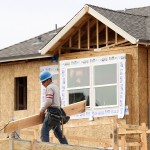Little By Little, Idaho’s Hard-Hit Housing Market Begins To Revive

Molly Messick / StateImpact Idaho
Nine homes are under construction at a Coleman Homes development outside of Boise.
Idaho was hit hard in the housing crash. For the better part of three years, the state’s foreclosure rate was one of the highest in the nation. The Boise area saw the worst of it. That means it’s been a while since this scene played out with any kind of regularity.
Little By Little, Idaho’s Hard-Hit Housing Market Begins To Revive
Lynne Smith pushes open the door of the home she’ll move into in just a couple of weeks. “This is it!” she says. “It’s just nice to come in and look around and say, ‘Oh, this is going to be my house!'”
It’s brand new. It even smells new.
“I can’t wait,” Smith says. “You know, it’s just me and my son, and he’s already picking out the paint colors for his room… It’s just really nice. He’s super excited about it.”
Some of the cities that fared worst in the housing bust are leading the way as home prices turn up. Think Phoenix, Arizona, Cape Coral, Florida, and our own Boise, Idaho. Lately, all three have seen home prices start to stage a turnaround – and prices are coming back faster than they are elsewhere in the country.
It was low interest rates and depressed home prices that drew Smith into the market. She thought she’d buy a foreclosure, and snap up a good deal. Instead, the search was a slog. She saw a lot of homes that had been damaged, or neglected. For the better places, competition was fierce.
“The things that are really nice and in good, clean shape that people actually took care of, they’re gone in like a day,” she says. “We would call the listing agent, and they would say, ‘Oh yeah, we have multiple offers,’ or, ‘We just got that offer sealed up 15 minutes ago.’ So – you really have to move quickly.”
Frustrated, Smith started looking at new homes. She stumbled on what’s more or less an open secret among builders right now: they’re accepting less profit. Suddenly, a new home seemed like a good decision. Smith isn’t the only one reaching that conclusion. In Boise, building permits for single family homes are up 65 percent over last year. Nampa is also seeing an uptick, and Neil Jones has a front-row seat.

Molly Messick / StateImpact
Neil Jones of the Nampa Building Department. The department's motto is "Building Safety Is No Accident."
In his office recently, he thumbed through a stack of residential permit applications. Those are the sheaves of paper he reviews and approves before construction starts. He counted them off under his breath. “Residential, that’s a new home. Another new home,” he said. There were eleven in total. “Wow,” he said. “I’m busy.”
Jones used to be a contractor, himself. He watched the housing slump put a lot of people he knows out of work. Now, he says, that’s starting to shift. Big homebuilders are doing most of the new construction, but the smaller guys are busy, too. “We’re seeing a lot of individuals who typically do two or three houses, they’ve already done those two or three,” Jones says. “They’re back out there in the market, which tells me that things are changing over and starting to go back up.”
The housing market isn’t fueling itself. Since late last year, Idaho’s unemployment rate has fallen to 8 percent, its lowest point in more than two years. The state’s manufacturing sector has begun to improve. All of that means more of this: construction work underway, in this case on a new three-bedroom home just outside of Boise. The sound of hammers is music to Rick Lett’s ears.
“Everyone’s getting busy,” Lett says. “Everyone’s seeing it, and everyone’s picking up. Everyone!”
Lett is the Director of Construction for Coleman Homes, an Idaho-based builder. As he says, they’re busy. Coleman’s sales have tripled since a year ago. Nine homes are going up in this neighborhood alone. Buyers’ move-in dates are already scheduled.
“One month, this whole street will be done. You know, and then we’re building down the other street. By the end of July, August, all 30 homes will be completed,” he says. There will be grass where there’s now bare dirt. It will look like a neighborhood.
A new sense of optimism is setting in, that much is clear. And according to regional housing expert Robert Lang, that’s warranted. The improvements in Boise’s housing market are a good sign. But, Lang says, “the question now is how sustainable that is.”
Lang is the director of Brookings Mountain West. He says yes, cities like Boise and Phoenix and Cape Coral, Florida do appear to be turning up. But it may be in part because they fared so badly that they’re improving now.
“Real estate that is overbuilt is a drag,” he says. “And it kills, like, you know, a household’s budget because they’re suddenly underwater. It kills construction, because nobody wants to build an office building anymore. When you start to recover, there’s been a turnover in who owns the buildings. And it begins to be a driver of economic development.”
In other words, when a housing market has cratered, buyers are drawn in.
It’s important to remember, Lang says, just how far hard-hit housing markets fell. In Boise, home prices remain more than 40 percent below where they were in 2006. They might be rising impressively now, but that’s taking a short-term view. Like most other cities, Boise isn’t out of the woods yet.



